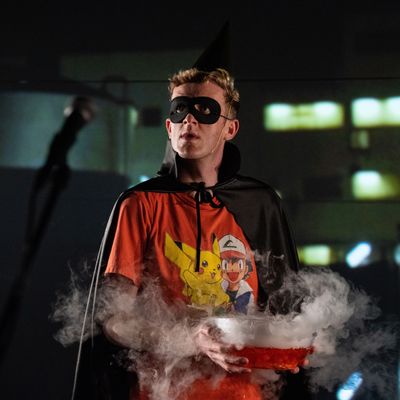
As we rolled past the hour mark of watching Édouard Louis murmur in French to a chair, the room settled into a deep despond. I have never seen a performance so intent on muffling its audience, so effective at freezing a room into a sepulchral, silent gloom. The performance text (single-spaced, tightly kerned) of Who Killed My Father is only 14 pages long; even the source material, a swift polemic of Louis’s own, doesn’t crack 100 pages. Yet it takes him more than 90 minutes to perform, thanks to the effortful creation of this foot-on-your-neck mood: Between every whispered line, he pauses, makes shy eyes at us, fingers his hair, lapses into melancholic reverie.
What, and I say this with concern, the hell. Why did no one flag down Louis or his director, Thomas Ostermeier, when the project was congealing into this? It was Ostermeier’s job to notice the wreckage, of course, since he’s the acclaimed theater director and Louis the (internationally famous author and) nonactor. Yet no one seems to have been seeing clearly. The pair have worked beautifully together before, as when Ostermeier adapted another of Louis’s memoirs, History of Violence, bringing in Laurenz Laufenberg to play Louis. Cutting the intermediary was a mistake; in performance, there’s magic in the middleman. Here, with only each other, they amplify their worst traits — Louis is an awkward nonperformer, and he makes Ostermeier’s usual bag of tricks (microphones, video backdrops, dance breaks) seem rote and manipulative, while the sleek image-maker Ostermeier makes Louis … insufferable.
Louis has been a respected author and public intellectual since his early 20s. His three blockbuster books deal with the rise of French right-wing nationalism and the reciprocal evils of poverty and masculinity culture, as well as homophobia, racism, and his experiences with assault. In Who Killed My Father, he discusses his father’s health, ruined first by an accident at a factory, then by diabetes and high cholesterol, then by dragging his wrecked spine back into the workforce.
Both book and monologue adaptation begin with a reference to Ruth Wilson Gilmore’s definition of racism as the exposure of some populations “to premature death.” Written as if he’s addressing his father, the text tracks a number of -isms responsible for his premature health problems: the machismo that made Louis’s dad choose “manly” work rather than the effeminacy of further schooling, the neoliberalism that wouldn’t let him rest even after his injury. Louis also knows specific people made those back-to-work policies, so he names names. Sarkozy. Hollande. He pins their pictures up on a clothesline and throws exploding caps at them.
These literal fireworks come only in the final, relatively brief section of the piece, however. For a long time before that, Louis speaks lugubriously into one of several onstage microphones — either directly to us, or to an empty, spotlit chair that represents his father. The content is wrenching stuff, proceeding through his father’s decay and the way the hateful man of his childhood has been cracked open and turned soft by pain. But Ostermeier’s show turns the script from pathos to bathos. In an unvarying tone, riddled with silences, Louis recounts miserable memories from his youth, including one incident where he deliberately causes a fight as a way to punish his mother for calling his evident queerness “disgusting.” The back wall of the stage fills with moody projections, either a dashcam view of foggy highways or desaturated photos of Louis’s hometown, Hallencourt, shot when stubble in the fields looked the most like blackened teeth. Now, this is right out of Cliché 101, specifically the class on “pathetic fallacy.” Why must they underline and emphasize Louis’s sadness this ham-handed way? Moisture is good! Fog is fine! Stubble in a field is perfectly natural.
Speaking of cliché, between the spoken sections, Louis lip-syncs to the songs he loved as a boy — first Aqua’s “Barbie Girl,” later Britney Spears’s “… Baby One More Time” — as he romps across the stage. In this he explicitly draws a line from his father’s inhibitions to his current freedom. He meditates on the few glimpses he has seen of his dad’s younger days; a picture of the supposedly hypermasculine laborer in drag hints at a never-discovered kinship. The lines get more overt. His father has lived in a gray town, never visiting the nearby sea, Louis says. Eventually, a black-and-white video clip plays on the wall of Édouard dancing in slow-motion in the surf. Get it?
It’s not appealing, this use of a human being. “Tu as raison,” his father supposedly said to him at the very end, accepting his revolutionary politics. “You are right.” Now Édouard Louis will repeat that validation for show after show, tour stop after tour stop. It sounds — despite his overt fury with the French politicians — like the core act of revenge here.
On the page, in the book, there’s only a hint of this moral shadow. Reading happens in the perpetual present, so in the book version, many of these same statements feel fresh, captured by a mind still roiling with putative grief and anger. A reader’s inner voice also transmits Louis’s own anguish better than he can do as a performer. He is not an actor, so he has few tools to either access or imitate his emotion in performance; repeating these thoughts again and again has made them sound stale, false, forced. Perhaps Louis’s many hesitations, made absurd by their length and pronounced air of Big Sad, exist so he can find the poignancy he felt when he sat down to write. It’s another fallacy, though. The more you wait for emotion to rush in, the more it ebbs away, away, away.
Who Killed My Father is at St. Ann’s Warehouse through June 5.
*Correction, May 24: This review originally referred to Édouard Louis’s father’s death; he is still alive, and those passages have been changed.


